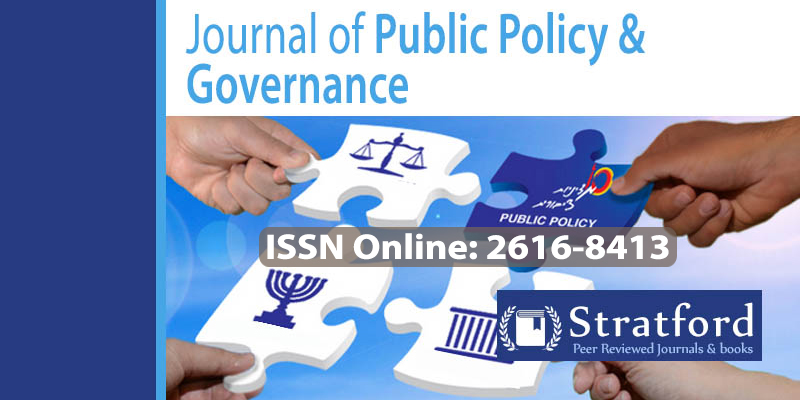The Role of Electronic Governance and its Impact on Accounting Systems
DOI:
https://doi.org/10.53819/81018102t5380Abstract
Electronic governance refers to the use of information and communication technologies by government agencies to provide services, exchange information, and engage with citizens. The adoption of e-governance initiatives has transformed traditional paper-based accounting systems in the public sector. This study examined the impact of implementing e-governance on governmental accounting practices. It focused on how automatizing routine tasks and integrating financial operations electronically enhances efficiency, transparency and accountability. The research methodology involved a comparative analysis of accounting procedures and financial reporting before and after e-governance adoption across various government departments. Findings revealed improved accuracy in revenue collection, expenditure monitoring, and fiscal reporting. However, challenges remain in terms of data security, integration complexities, and resistance to change. Overall, e-governance emerges as a potent catalyst for reforming public financial management. It paves the way for real-time, standardized, and tamper-proof accounting systems that strengthen fiscal discipline. In conclusion, automation and integration of accounting operations through e-governance emerges as a potent catalyst for public financial management reform. Financial digitization is key for 21st century governance. Policymakers should continue assimilating emerging technologies to optimize accounting and exceed citizen expectations while upholding public interest.
Keywords: E-governance, accounting systems, governmental accounting, financial reporting
References
Adams, J., Khan, H.T.A., Raeside, R., & White, D.I. (2018). Evaluating the barriers to successful implementation of e-government initiatives. Journal of Enterprise Transformation, 8(1-2), 32-47.
Beldad, A., van der Geest, T., de Jong, M., & Steehouder, M. (2010). How shall I trust the faceless and the intangible? A literature review on the antecedents of online trust. Computers in Human Behavior, 26(5), 857-869. https://doi.org/10.1016/j.chb.2010.03.013
Brown, A. & Solomon, D. (2017). The impact of e-governance on governmental accounting reform: A comparative analysis. Journal of Government Financial Management, 62(4), 20-28.
Chan, J. L. (2001). The technological game: How information technology is transforming public administration. Bulletin of the American Society for Information Science and Technology, 27(1), 17-20. https://doi.org/10.1177/1466802501001002001
Chen, C. & Lopez, J. (2021). Securing e-governance: Mitigating data breach risks in public sector digitization. Government Information Quarterly, 38(4), 101512.
Davies, P.J. (2019). Integrated accounting systems: How technology improves financial data quality. Public Money & Management, 39(3), 206-212.
Devados, M., Rahman, A., & Cahan, S. (2020). The impact of e-government on the quality of public financial reporting. Journal of Contemporary Issues in Business and Government, 26(2), 3217-3227.
Gonzalez, R., Gasco, J., & Llopis, J. (2007). E-government success: Some principles from a Spanish case study. Industrial Management & Data Systems, 107(6), 845-861. https://doi.org/10.1108/02635570710758752
Gupta, M.P., & Jana, D. (2003). E-government evaluation: A framework and case study. Government Information Quarterly, 20(4), 365-387. https://doi.org/10.1016/j.giq.2003.08.002
Heeks, R. (2002). e-Government in Africa: Promise and practice. Information Polity, 7(2,3), 97–114. https://doi.org/10.3233/IP-2002-0008
Hughes, A.J. (2010). Electronic cash management and control: Revolutionizing public sector fund oversight. The Government Accountants Journal, 53(2), 34-47.
Jones, V.L. & Willis, D.L. (2019). E-governance and transformed expenditure authorization: Improving fiscal transparency through financial automation. The American Review of Public Administration, 49(6), 652-660.
Lee, G., & Rodrigues, R. (2016). Implementing e-governance for modern government accounting: Benefits and challenges. In R. Smith & N. Madison (Eds.), Emerging Research on Electronic Government (pp. 1-25). IGI Global.
Mahler, J., & Regan, P.M. (2002). Learning to govern online: Federal agency Internet use. American Review of Public Administration, 32(3), 326–349. https://doi.org/10.1177/0275074002032003004
Norris, D. F., & Lloyd, B. A. (2006). The scholarly literature on e-government: Characterizing a nascent field. International Journal of Electronic Government Research, 2(4), 40-56. https://doi.org/10.4018/jegr.2006100103
Patel, R.P. (2018). Public sector accounting reforms through e-governance: A comparative perspective. Journal of Comparative Policy Analysis, 22(5), 492-505.
Rodriguez, D. L., & Smith, H. J. (2010). Electronic governance and information and communication technology policies: An overview. In A.
Kalu & H. J. Smith (Eds.), Information and communication technologies management in turbulent times (pp. 300-315). IGI Global.
Rodriguez, D. L., Smith, H. J., & Mansfield, N. R. (2007). e-Government in Latin America and the Caribbean. Telecommunications Policy, 31(7), 408-424.
Schware, R., & Deane, A. (2003). Deploying e-government programs: The strategic importance of “I” before “E”. Info, 5(4), 10-19. https://doi.org/10.1108/14636690310495193
Sharma, S. K. (2009). Data collection and survey research in e-government. In A. Datta (Ed.), Implementing
Smith, M.L. (2005). Implementing effective e-governance: A framework of challenges and opportunities. Public Administration & Management, 10(1), 70-91.
Srivastava, V. (2010). Effect of e-government systems on corruption: Exploring causality. Electronic Government, an International Journal, 7(4), 380-404.
Tan, C., & Pan, S. L. (2003). Managing e-transformation in the public sector: An e-government study of Inland Revenue Authority of Singapore. European Journal of Information Systems, 12(4), 269-281. https://doi.org/10.1057/palgrave.ejis.3000479
Wang, C. (2016). Ensuring government's abilities of financial governance in e-governance practices. Public Finance and Management, 16(4), 263-277.
Wescott, C.G. (2003). E‐government to combat corruption in the Asia Pacific region. Asian Journal of Political Science, 11(2), 1-24. https://doi.org/10.1080/02185370108434189
Williams, J., Srivastava, V., & Rodzik, O. (2009). E-government adoption in developed countries: A quantitative analysis. International Journal of Electronic Governance, 2(4), 423-437.
Wu, J., & Zhang, N. (2005). An internet information system model for e-government. Electronic Government, an International Journal, 2(4), 406-427.
Zhao, F. (2021). The impacts of information and communication technology on public sector accounting and financial reporting. Journal of Public Budgeting, Accounting & Financial Management. Advance online publication. https://doi.org/10.1108/JPBAFM-07-2020-0097.
Zhiyuan, F. (2002). E-government in digital era: Concept, practice, and development. International Journal of the Computer, the Internet and Management, 10(2), 1-22.


